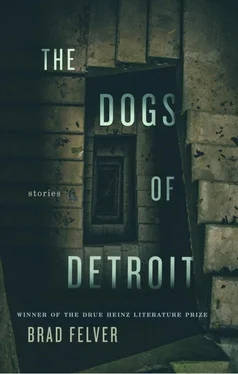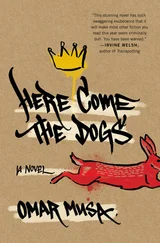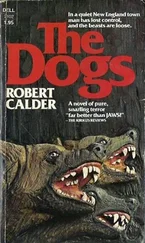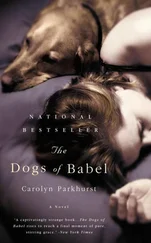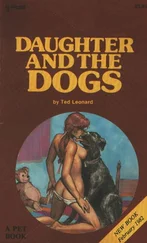The carcass festers on the porch, freezing and thawing along with the weather’s fluctuations. Patches of its mane still grip the neck, but much of its hair has fallen off and sticks between the cracks of the floorboards. Vultures have eaten most of its paunch, ripped strings of its bowels out and flown away with them in their beaks like fat worms. The reek of it chokes the house and even the barnyard. The golden ring still hangs from the rope, though it would take only a small tug to free it from the mule’s bit.
Early March and Wiley walks the long rows and plants the grains with the uncle. The soil remains hard, and they must till much of it with a spud bar since they no longer have the mule to drag the plow. They carve long rows of cockeyed V’s, trickle sorghum seeds, and cover them. And they wait, long hours they wait for green leaves to sprout and for the ape man to appear on the horizon.
Mid-spring, and the mother wilts and dies. It is slow and loud. For weeks no one sleeps at night because her moans rattle even the spoons and forks in the drawer. Her gray skin yellows and opens as if gangrene speeds through her veins. Helen does not leave her often, only to fill buckets of cold water and to clean puss from the rags that bathe her forehead. She listens to the mother’s rattly breathing when she sleeps, and this is when the uncle descends.
We need fresh bread, he says to her. I need my shirt washed, he says. Come sit with me, he says, and pats the lumpy cushion next to him.
Go torture a scarecrow! she shouts at him, and he leaves her to tend to the mother, though his eyes always trace back toward her. She can feel his eyes, and she knows the way of things in this world, the way of replacements, and his desire for more field hands.
They bury the mother at sunrise in early spring when the frost has withdrawn for the season. Wiley fashions a headstone by breaking off barn siding and cinching it with twine. He carves into it the word Mother , digs a trench, and anchors it into the ground above her. Then they all stand and look down at it, and no one speaks. Helen grips Wiley’s hand, and the silence infects them until they are all afraid to move.
That night there are no animal noises from the bedroom, but they hear the uncle’s sobs. He has shown no regret in front of them, no trace of sadness, but the awful tempest within him unleashes with the loneliness. He has lost so much with her. For a moment Helen feels for him, the howling and tortured beast that cannot not be domesticated by this world. He has no place but on his lonely dust farm, no capacity to comprehend the fundamental order he has disturbed.
The harvest is slow in the summer as Wiley and the uncle must scythe and hack the heavy stalks and drag them by hand. Wiley replaces the mule at the sorghum press, circling for long hours as the uncle feeds the brambles in to be mashed. The orbital bone will not set properly, and so his face is locked in a perpetual and lopsided grimace. Even his smile appears sinister, like some malevolent marionette with its strings drawn too tight.
For three years they carry on this way, Wiley growing strong, growing weary. He does not speak of the ape man or of his delayed return, but he thinks of it daily and fears both his appearance and his absence.
Maybe he died, Helen says at breakfast.
Wiley glares at her and says nothing. He sits quietly, looks down. We need more coffee, he says.
His shoulder muscles bulge now from the long workdays with no mule, and his forearms have tanned and grown veiny. Long scars carve his hands and up to his elbows, scars from working sharp tools beyond his capacities. And he has grown serious, agonies scored about his face, and for this, the uncle commends him. This, he says, is how we become capable men. It was the same for me. One day, he says, you’ll have your own mule, and the burdens will ease.
Helen has grown tall and thin. Her face has hardened, and though she is not beautiful, she is still too beautiful for such a place. Her wiry muscles also stretch as she works the field next to Wiley. He will rarely let her from his sight. It is only Wiley and his thick muscles, his glower, that keeps the uncle away from their bedroom at night.
The mule carcass has melted away, and all that remains are the bones: ribcage and legs and enormous hips, untouched all this time. The rope has detached from the bridle, and so nothing keeps the ring shackled to it. The ape man’s plan has worked, and yet he does not return. The uncle avoids the porch because this would acknowledge the truth of Wiley’s story, but he does not order the bones cleaned up.
And they wait for the ape man. It is four years, then five, and still Wiley knows he will return. He must return. The uncle still pretends there is no ape man, but in all this time he has not removed the mule bones, has not ordered Wiley to do so. Still they cling to the front porch. They have yellowed, and dirt cakes into the eye sockets.
The uncle has withered. Whether from the endless toil or the thought of the ape man or the death of his sister, it is hard to explain. He sleeps late and eats little, and when Wiley needs an extra hand, he shouts in to Helen. When the uncle drinks too much sorghum rum, Wiley smacks his temples red with the flat of his callused hands. You drink our dinner, you fool! he shouts at the uncle. Helen must sit between them at dinner as Wiley stares at the uncle, seething. More than once she has pulled her brother away for fear he would kill the uncle with his fists.
The absent ape man breeds a meanness in Wiley that was never there before. Every day he has not returned, Wiley’s shoulders coil tighter until he snaps even at Helen. He is a hulking specter of the towheaded boy he was, scowling and clenching a cob pipe between his yellowed teeth. He glowers down at Helen, and it is not unlike the looks the uncle gave her years earlier. She fears what the world makes him into. Wiley claims to want only enough saved income to purchase an old tractor—an Allis-Chalmers or Farmall or even a newer Deutz. He will never buy a mule. He is convinced they might undo the land’s blight, and their own, with modern implements. Helen thinks he is perhaps correct in this, that the endless toil and inch-thick calluses have animalized him. He growls more than he speaks, often eats while standing and with his dirty hands.
Seven years after the ape man, the uncle dies. He has lost nearly half his body weight, and his knuckles bulge. He drinks much of the season’s rum, and Wiley allows it because it pacifies him.
Before he dies, the uncle waves Wiley over. They sit at the kitchen table in summer, but it is chilly, and Wiley stokes the coals. The uncle and Wiley sit quietly for a while, the uncle drawing his thin, wheezing breaths, and Wiley inhaling the heavy plumes from his cob pipe. The wind gusts through the siding and into the kitchen, swirling dirt about the floorboards.
What did he look like? the uncle asks, and Wiley knows what he means.
Wiley describes the scars and the tattoos. He mentions the pox blemishes. He pauses, and then he describes the ape arms. They dangled, he says, like twine, longer than his legs. He carried a jungle gun, an African thing made for elephants and lions. He was like a circus show, more animal than man. His speech quickens, and he describes the mule’s exploding brain, how it burst like a squeezed seed. He has not spoken this many words together in a year. He tells the uncle of the storm the night before and of wrestling Helen in the mud pit.
The uncle smiles at him. He even laughs, though it erupts like a cough. Wiley pulls out a wad of handkerchief, hands it to the uncle.
The uncle coughs blood into the handkerchief. And what if he comes back? he asks. What do you do then?
Wiley has thought of little else for years, but he has no answer and never will. He looks down.
Читать дальше
